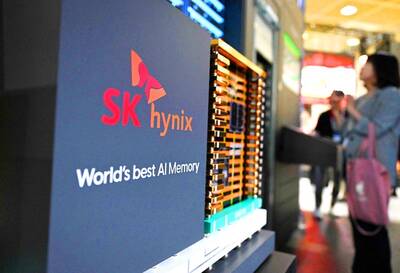A billion-US dollar Chinese plan to invest in Western Digital Corp (WDC) is designed to plug the US data storage firm into a network of influential tech players carefully constructed by Beijing’s Tsinghua University, the alma mater of Chinese President Xi Jinping (習近平).
For US$3.8 billion, a unit of state-owned Tsinghua Holdings Co (清華控股) is to get a 15 percent stake in Western Digital, according to the deal, which was signed on Wednesday.
What Tsinghua — run by a university committee — hopes to get is the latest in a string of domestic and foreign footholds in data storage and the chip market, an area deemed of strategic importance by Beijing.
The deal follows Tsinghua’s US$23 billion move to buy US chipmaker Micron Technology Inc as China ramps up efforts to develop chips expertise.
However, the Micron plan has been clouded by US concerns over national security, while some say the Western Digital deal might follow suit.
“Its [Tsinghua’s] Chinese government affiliation is making its overseas acquisition more difficult,” said Carlos Peng (彭國維), an analyst at Fubon Securities Investment Services Co (富邦投顧) in Taipei.
Western Digital hopes selling the minority stake to Tsinghua’s Unisplendour Corp (紫光) would help it avoid rigorous regulatory scrutiny.
If the deal goes through, the California-based firm will have a new investor with a wide range of Chinese tech units, from IT services provider Unisplendour to biotechnology firm Chengzhi Shareholding Co (誠志股份).
The Tsinghua network also stretches to other US firms.
“We think the cash infusion bolsters WDC’s already strong balance sheet,” RBC Capital Markets analyst Amit Daryanani said on Wednesday in a note to clients.
Expansion in storage systems and flash memory, which is faster than traditional hard drives, have been focuses for Western Digital, Daryanani said.
“We could see the company take a bigger step in both these directions from an M&A [mergers and acquisitions] perspective,” he added.
Western Digital said in a statement that it would use cash from the deal to improve its balance sheet and pursue growth initiatives.
The Irvine, California-based company had about US$5.3 billion in cash at the end of its most-recent quarter, according to data compiled by Bloomberg.
Unisplendour agreed to purchase a 15 percent stake in the US company by buying newly issued shares at US$92.5 apiece, 33 percent higher than their closing price on Tuesday.
Its stock rose 15 percent to US$79.44 at the close on Wednesday in New York, marking the biggest gain in three years.
The deal is Unisplendour’s biggest acquisition this year, after agreeing in May to pay US$2.3 billion for a 51 percent stake of Hewlett-Packard Co’s H3C Technologies Co (華三通信技術), creating a Chinese tech hub that houses H3C’s networking operation alongside its China-based server, data-storage and technology-services businesses.
Last year, Intel Corp bought a US$1.5 billion, 20 percent stake in two mobile chipmakers under Tsinghua’s umbrella.
That provided the Chinese firm with support from a US semiconductor giant on chip design and development within China itself — a landmark deal for Beijing.
“It [China] is producing its own products rather than just contract making. It is because there is demand from local consumption,” Gartner Inc analyst Tracy Tsai (蔡惠芬) said.
“Tsinghua, with its state-backed role, plays a key part under this background. It needs to introduce partners through mergers and acquisitions and help China boost its technology know-how,” Tsai said.
Additional reporting by Bloomberg

Intel Corp chief executive officer Lip-Bu Tan (陳立武) is expected to meet with Taiwanese suppliers next month in conjunction with the opening of the Computex Taipei trade show, supply chain sources said on Monday. The visit, the first for Tan to Taiwan since assuming his new post last month, would be aimed at enhancing Intel’s ties with suppliers in Taiwan as he attempts to help turn around the struggling US chipmaker, the sources said. Tan is to hold a banquet to celebrate Intel’s 40-year presence in Taiwan before Computex opens on May 20 and invite dozens of Taiwanese suppliers to exchange views

Application-specific integrated circuit designer Faraday Technology Corp (智原) yesterday said that although revenue this quarter would decline 30 percent from last quarter, it retained its full-year forecast of revenue growth of 100 percent. The company attributed the quarterly drop to a slowdown in customers’ production of chips using Faraday’s advanced packaging technology. The company is still confident about its revenue growth this year, given its strong “design-win” — or the projects it won to help customers design their chips, Faraday president Steve Wang (王國雍) told an online earnings conference. “The design-win this year is better than we expected. We believe we will win

Power supply and electronic components maker Delta Electronics Inc (台達電) yesterday said it plans to ship its new 1 megawatt charging systems for electric trucks and buses in the first half of next year at the earliest. The new charging piles, which deliver up to 1 megawatt of charging power, are designed for heavy-duty electric vehicles, and support a maximum current of 1,500 amperes and output of 1,250 volts, Delta said in a news release. “If everything goes smoothly, we could begin shipping those new charging systems as early as in the first half of next year,” a company official said. The new

SK Hynix Inc warned of increased volatility in the second half of this year despite resilient demand for artificial intelligence (AI) memory chips from big tech providers, reflecting the uncertainty surrounding US tariffs. The company reported a better-than-projected 158 percent jump in March-quarter operating income, propelled in part by stockpiling ahead of US President Donald Trump’s tariffs. SK Hynix stuck with a forecast for a doubling in demand for the high-bandwidth memory (HBM) essential to Nvidia Corp’s AI accelerators, which in turn drive giant data centers built by the likes of Microsoft Corp and Amazon.com Inc. That SK Hynix is maintaining its